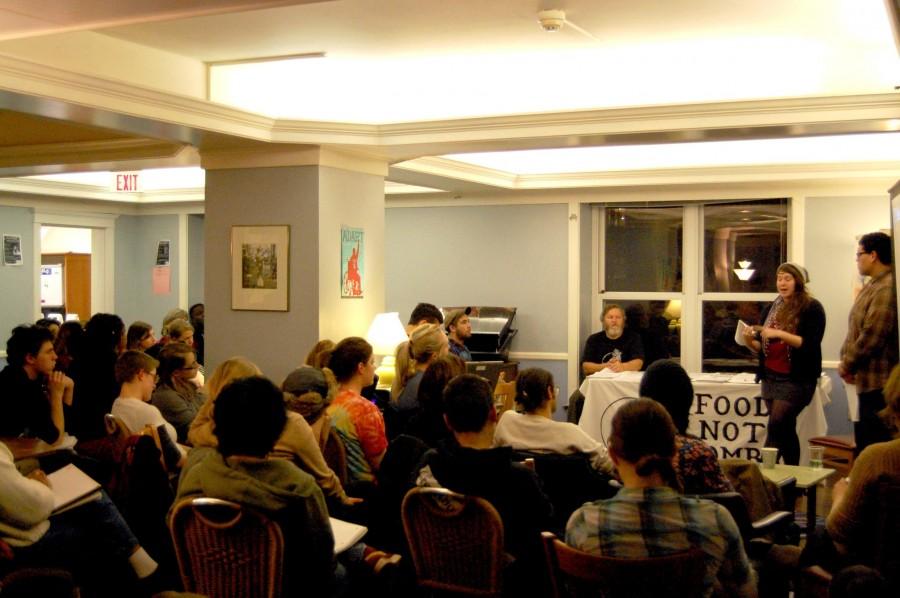Against the backdrop of a colorful poster depicting people in an upbeat landscape of clouds and free food, the noise of some 50 people crammed into the Greenleaf Coffee Co-Op gradually came to a hush. Attention quickly shifted to the night’s keynote speakers, spokespersons from an international network of collectives called Food Not Bombs.
International spokesperson and founding member of FNB Keith McHenry, took the stage to delve deeper into the story of this amalgamation of collectives.
“It all started when I was a student at Boston University 30 years ago and Howard Zinn was one of my professors,” said McHenry. “He had the habit of encouraging all of his students to go to these protests for a nuclear power plant that was being built and eventually people started getting arrested.”
Attempting to raise funds for the imprisoned protesters, McHenry and his friends started making baked goods in order to meet bail and release them. What started out as an activity to help friends in need ultimately raised a larger question: what if the money spent on America’s defense budget was spent on providing basic necessities such as food and shelter?
“We started to collect all of the food being thrown out from our workplaces, and got hooked up with a tofu factory,” said McHenry. “Then we started handing out the food at a number of different places in Boston.”
The impromptu efforts of these students to deal with the issue of homelessness and hunger provoked massive arrests, which actually served to bring more attention to FNB and inspire similar chapters.
FNB rejects organizational labels. While the network does not espouse any specific political ideology, a majority of its founding members were anarchists. Each chapter of FNB acts autonomously and makes consensus-based decisions.
Today, chapters of FNB are found in up to a thousand locations around the world, and in such disparate locales as Japan, Nigeria, and even in Greensboro.
FNB coordinators Jordan Green and Saralee Galien recounted more about the background and mission of FNB in Greensboro.
“Food Not Bombs helps homeless and marginalized people get basic, nutritious food, acting on the belief that healthy food is a privilege and not a right,” said Green.
Green said that FNB in Greensboro began 15 years ago in and around collective houses on Tate Street. Since the closing of the Hive, the Greensboro branch of FNB has operated out of the Tanenbaum-Sternberger room at The University North Carolina at Greensboro, where they typically serve 100 people in any given week.
The efforts of FNB to combat hunger and injustice often involve vocal protest. These actions have lead to the targeting of FNB chapters both in and outside of the United States.
“We have had FBI informants try to infiltrate our chapters here in the U.S., and faced kidnappings and assassinations of Food Not Bombs volunteers in Kenya,” said McHenry.
While some have called FNB “unpatriotic,” McHenry has a different view.
“We are unpatriotic in the sense that we are willing to denounce what we view as unjust acts by our country,” said McHenry.
“Although he used the term unpatriotic to describe the actions of Food Not Bombs, I would not necessarily describe it as such,” said first-year Billy Millman. “In fact, I feel that attempting to change the world in the way Food Not Bombs does could actually be considered patriotic.”
McHenry provoked a great deal of discussion amongst the students present about how to approach issues of homelessness and poverty.
“I was ready for action when leaving the Greenleaf … the speaker (McHenry) became more inspiring with every word and made me want to contribute more (to the cause of FNB),” said first-year Sara Besmertnik.
“Ultimately the point that Food Not Bombs tries to make is that societies can be changed to provide support for human needs,” said McHenry.

